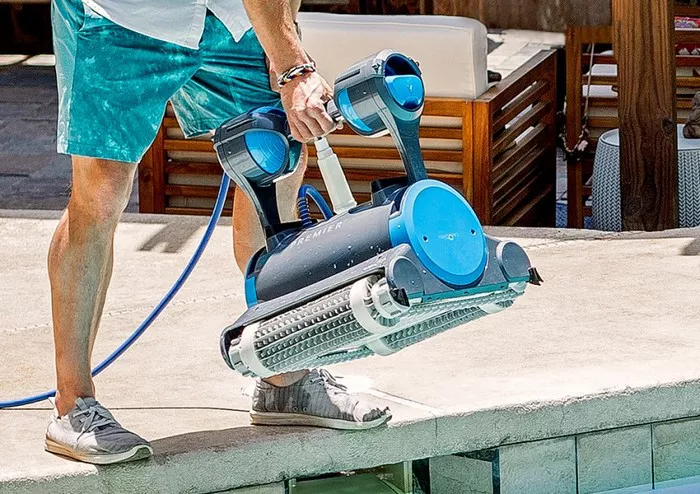The pool vacuum cleaner is an essential tool for pool cleaning, capable of effectively removing debris, debris, and algae from the bottom of the pool, maintaining clean and hygienic pool water quality. This article will provide a detailed introduction to the definition, types, usage methods, advantages and disadvantages of pool vacuum cleaners, as well as comparisons with other cleaning tools, to help readers choose the pool vacuum cleaner that suits them and master the correct usage techniques.
I. Definition and Role of Pool Vacuum Cleaners
The pool vacuum cleaner is a device specifically designed to clean the bottom of the pool. It simulates the movements of human swimming to generate suction at the bottom of the pool, sucking impurities such as dirt, debris, and algae into the vacuum cleaner, thereby achieving the purpose of cleaning. The role of the pool vacuum cleaner is not only to clean but also to protect the water quality of the pool, prevent bacterial growth, and provide a healthy and comfortable swimming environment for pool users.
II. Types and Characteristics of Pool Vacuum Cleaners
1. Manual Pool Vacuum Cleaner: This type of cleaner requires the user to hold the vacuum cleaner and manually push it to clean the pool. Its advantages are low price and simple operation; the disadvantages are that it requires users to expend physical energy and has low cleaning efficiency.
2. Automatic Pool Vacuum Cleaner: Automatic vacuum cleaners can autonomously move on the bottom of the pool, and users only need to set the cleaning path. Its advantages are high cleaning efficiency, saving time and effort; the disadvantages are high price, requiring professional installation and maintenance.
3. Robotic Pool Vacuum Cleaner: This type of cleaner uses advanced artificial intelligence technology to autonomously plan cleaning routes, avoid obstacles, and achieve automatic charging. Its advantages are high intelligence and good cleaning effects; the disadvantages are high price and the need for professional after-sales service.
4. Pressure Pool Vacuum Cleaner: This type of cleaner cleans the pool using high-pressure water flow and has powerful cleaning capabilities. Its advantages are good cleaning effects and suitability for large pools; the disadvantages are the need to connect to a water pump, and complex installation.
III. Usage Methods and Techniques
1. Preparation: Before using the pool vacuum cleaner, ensure that there are no debris such as fallen leaves or toys in the pool. At the same time, check whether all parts of the vacuum cleaner, such as the suction head and hose, are intact.
2. Assemble the Vacuum Cleaner: Assemble the vacuum cleaner according to the instructions and install the suction head on the hose. Ensure that all connection points are tightly sealed to prevent air leakage.
3. Connect to Water Source: Connect the vacuum cleaner’s suction pipe to the pool’s drain or dedicated suction port. Ensure a secure connection to avoid water leakage.
4. Start the Vacuum Cleaner: Turn on the power switch of the vacuum cleaner to start it. Adjust the suction size as needed. During suction, keep the vacuum cleaner moving steadily at the bottom of the pool to avoid collisions with the pool wall or other objects.
5. Cleaning Completion: When the dust collection box of the vacuum cleaner is full, turn off the power switch. Remove the vacuum cleaner from the pool and empty the dirty water from the dust collection box. Clean all parts of the vacuum cleaner, especially the filter and suction head, to ensure clean effects for the next use.
6. Storage of Vacuum Cleaner: After cleaning the vacuum cleaner, store it in a dry and ventilated place. Avoid direct sunlight and humid environments to prolong the service life of the vacuum cleaner.
IV. Comparison of Advantages and Disadvantages
1. Comparison with Manual Cleaning Tools: Compared with manual cleaning tools, pool vacuum cleaners have the advantages of high cleaning efficiency, saving time and effort. However, their disadvantages are high prices and the need for professional installation and maintenance.
2. Comparison with Other Cleaning Tools: Compared with other cleaning tools such as pool brushes and chemical cleaners, pool vacuum cleaners have the advantages of good cleaning effects and minimal impact on water quality. However, their disadvantages are the need for a certain investment cost, and safety issues need to be considered during use.
V. Conclusion
Choosing a good pool vacuum cleaner is crucial for maintaining clean pool water quality. When choosing, consider your actual needs and budget to choose the type that suits you. At the same time, mastering the correct usage methods and techniques is also the key to ensuring cleaning effects. Through the introduction in this article, it is hoped that readers can have a deeper understanding of pool vacuum cleaners, choose the product that suits them, and provide a healthy and comfortable swimming environment for their families.

